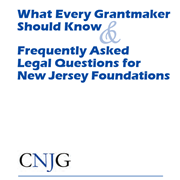Site Search
- resource provided by the Forum Network Knowledgebase.
Search Tip: Search with " " to find exact matches.
These resources are from CNJG's 2016 Annual Meeting & Holiday Luncheon where the topic of shifting demographics was explored. Research by the Pew Research Center shows that New Jersey, and the nation, is experiencing the most striking social,...
Confounded by what to do and how to be in your role right now? What does it mean to be focused on a vision of racial equity, well-being, gender justice, economic health when people, institutions, and the systems that have allowed most of us to at...
Sample bylaws for Community Foundations.
This tool for unstaffed foundations includes an accountability self-assessment and a legal checklist. It is divided into nine topic sections, each of which is divided into three levels, which can help foundations tailor the tool to meet their specific...

This guide was designed to help the state’s philanthropic community understand their ethical, legal, and fiduciary requirements and obligations.
The Office of the Governor has taken extraordinary steps to mitigate the spread of the coronavirus and protect the health and well-being of New Jerseyans. Among the Governor’s executive orders includes the creation of the State Coronavirus Task Force...
As New Jersey enters its 9th week of sheltering in place and the close of businesses deemed non-essential, we have already seen the impact of policy decisions and the immense and growing need in our communities. The sheer number of people stricken...
At a time when nonprofits and philanthropy were needed the most, the pandemic forced most social sector organizations to go fully or partially remote. As we enter 2021, it seems that many organizations will continue to operate virtually for some time...
TD Charitable Foundation, the charitable giving arm of TD Bank, America's Most Convenient Bank®, awarded 32 local organizations from Maine to Florida nearly $5 million through its 15th Annual Housing for Everyone grant competition. The Housing for...
The Thurgood Marshall College Fund (TMCF) has announced a 10-year, $20 million commitment from Novartis in support of students and faculty at historically Black colleges and universities (HBCUs) and medical schools.
With the goal of...
